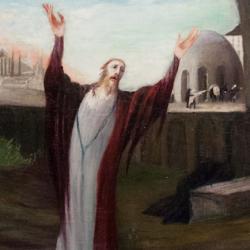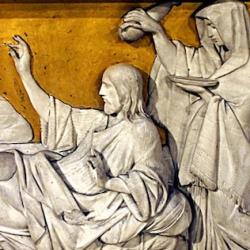Two groups rush away from Jesus’ empty tomb. Both of them have news.
The women came to the tomb looking for Jesus, but now they have heard the angel’s announcement that Jesus is risen, and obey the angel’s command to go to the disciples and announce the resurrection to them. Along the way, Jesus Himself appears to them and repeats the instructions. Matthew uses a verb here that contains the word “angel,” which in Greek simply means “messenger.” They go off to “report” (v. 8), and then Jesus tells them to “report” (v. 10). Both verses use the verb apaggelo. Having listened to the angels, they women become angels, messengers taking the Easter gospel to the disciples.
But there’s another group heading off from the empty tomb too, and they too have a “report.” They too have become “messengers” or “angels.” Matthew uses the same verb – apaggelo – to describe the guards who go into the city to “report” to the chief priests.
The soldiers and the women have been contrasted before. The soldiers sat watching Jesus at the foot of the cross, while the women sat watching Jesus’ death from a distance. Once Jesus’ body has been placed in the tomb, the women watch the tomb, while Pilate sends a detachment of guards at the tomb to prevent the disciples from stealing Jesus’ body. Now, both of them have seen the angel’s appearance. Both of them saw that the angel’s face was like lightning, and that his garments were glistening white like snow. Both saw this, and both were afraid. The soldiers fell as dead men, but the women feared and rejoiced and listened to the angel. Now, both the women and the soldiers have become “angels,” messengers announcing the news. Both of them go off to report the incident that they have witnessed.
The soldiers start out as faithful witnesses to the resurrection. Matthew tells us that the guards report everything that happened. At the end of Matthew’s story of the crucifixion, the centurion who is head of the soldiers at the cross sees “all that had happened,” he concludes that Jesus must have been the Son of God. And the other soldiers join him in that confession. Now the chief priests hear an even more astonishing report. The guards tell them all that had happened, everything. They tell the chief priests that they saw an angel come from heaven. They felt the earthquake. They saw the angel roll the stone away and sit on it. They saw the angel’s face and his garment.
That can mean only one thing: The God of heaven, the God whom they claim to worship, has intervened on Jesus’ behalf, and reversed everything that had happened to Jesus. God has turned around His death, bringing Him back to life; God has turned around His burial, opening the tomb. That can only mean that the judgment against Him was reversed too. God has intervened and overturned the judgments of Pilate and the Jewish leaders, vindicating the condemned Jesus. If an angel from heaven came like lightning, with an earthquake, to open the tomb, that can only mean that the chief priests were completely and utterly mistaken about Jesus.
The chief priests hear all that, but do not believe. They know the whole story of the death and resurrection of Jesus. They are aware of all the signs that Jesus was the prophet of God, the Son of Man. But they won’t believe. The guards had the good sense to be afraid when they saw the angel. The chief priests are so hardened that they don’t even express any fear. They can fix this. They can handle this. A bit of money, and spin control, and it’ll all go away.
It is not surprising then that when Jesus appears to the eleven, He doesn’t send them out to the lost sheep of the house of Israel, as He did earlier in His ministry. He instead sends the disciples out to disciple the nations, the Gentiles. The Jews have rejected their Lord; even when He rises from the dead, they reject Him. And so He turns from them to the nations.
Of course, the Jewish leaders do more than disbelieve. They persuade the soldiers to offer an alternative account of what happened. The guards come to the chief priests reporting all that has happened, but when they leave they are telling a different story (v. 15). They come in as angels, declaring everything that God has done in Jesus. They leave with a false report, as false angels.
It’s not a very convincing story, and it doesn’t reflect well on them. They admit that they slept on the job, not a very professional demeanor for a guard. Yet, somehow, even though they were asleep, they know exactly what happened at the tomb. They know that someone came to take the body of Jesus, and they know who those someones were – the disciples of Jesus. It’s an ironic conclusion to the work of the guards. They were hired to prevent the disciples from stealing the body, but they admit that they failed. They were hired to prevent the disciples from spreading a deception, but they end up spreading a false report themselves.
What transforms their story from a story of angels and earthquakes and rolling stones into a story of deception is money. Here’s a clue to the machinations of Jesus’ last week: Follow the money. The chief priests have already used money to get their way with Jesus. They paid Judas thirty pieces of silver to betray Jesus. They use their money to buy treachery. They used their control of the mob to pressure Pilate to condemn Jesus. They are able to control the Roman courts, pulling strings from a distance. Now they use money to control the media. The chief priests have their hands on the levers of power. They can purchase alliances, they can pressure the courts, they control the media, so that their “message,” their “announcement,” their “gospel” gets the most air time.
The effect of this deception is chilling. Jesus gave only one sign to “this generation,” the sign of Jonah (Matthew 12:38-41). But the men of Nineveh were more responsive than the Jews, for they repented when Jonah rose from the death waters and preachers to them. The Jews don’t. They conspire to make sure that no other Jews know about the sign.
Two groups of angels, two messages.
Even before the disciples see the Risen Jesus, even before they are commissioned to disciple the nations, the gospel has a competitor. There’s an alternative explanation of the events of Easter morning, a naturalistic account. As soon as the gospel goes out, it is already going out contested. It already has a rival. The gospel has always been an embattled message. Today we have many rivals – heretical groups that claim to be Christian, secular gospels that promise health and salvation without Jesus. But that’s nothing new, and it won’t go away. From the beginning to the end of the world, there will be different explanations, different reports, different messages, different gospels.















